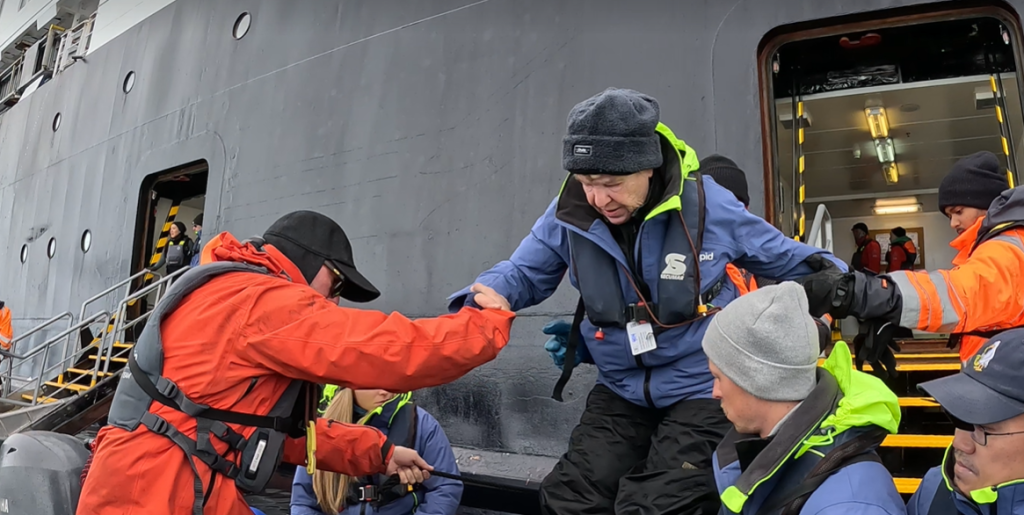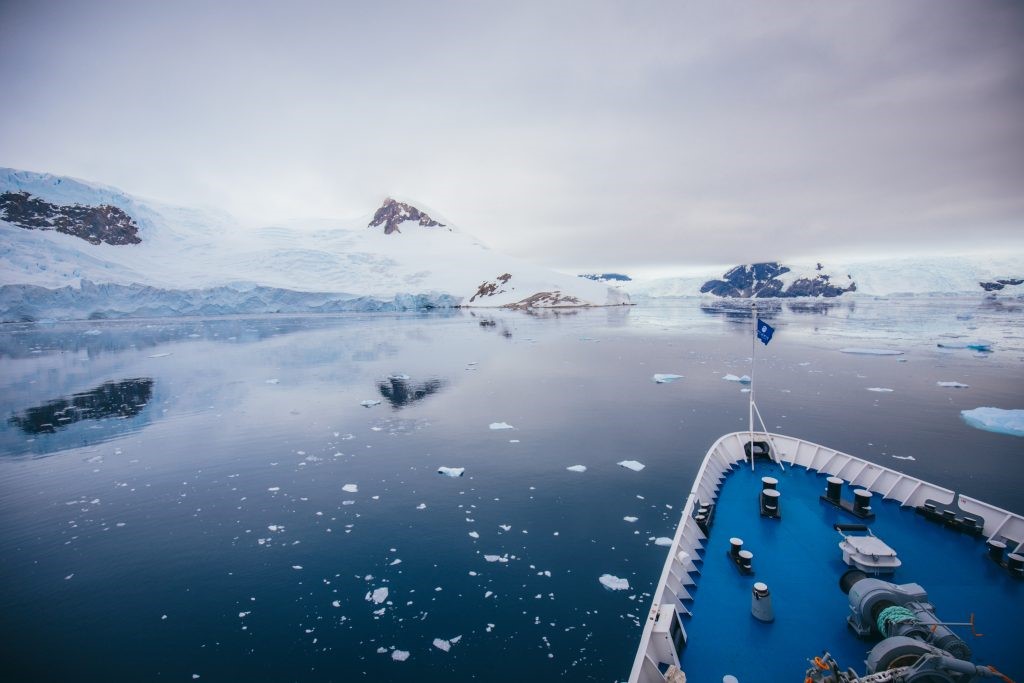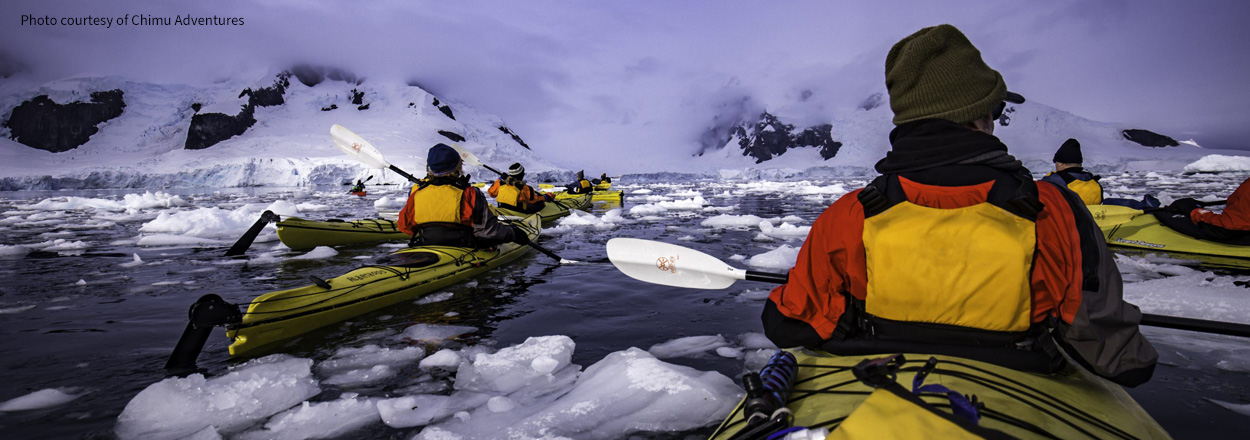When travelers consider booking a trip to Antarctica, a question may cross their minds: Does one need the stamina of a superhuman to conquer this frozen frontier? Surprisingly, the answer is no. Anyone who is mobile and in good health can thrive on an Antarctic expedition cruise.
If your client is planning a trip to Antarctica, check out this Chimu Adventures-approved guide to fitness and health requirements for South Pole visitors.
What Physical Challenges Will Travelers Encounter?
Many Antarctic cruises are considered “light adventures,” making them an ideal choice for most travelers, so long as they are minimally fit. The expedition poses some fitness challenges, but they are manageable and can be adjusted according to passengers’ needs.
Throughout the journey, travelers will need to embark, disembark and maneuver around the ship independently. Fortunately, every vessel has handrails to assist with balance.
More challenging, travelers must step from the ship into the inflatable Zodiac boat, which can feel unstable as it bobs in the water. The ship’s crew will assist with boarding and give a briefing of the process prior to the first expedition, but it is helpful to be familiar with the movement of the Zodiacs. However, Zodiac embarkment proves to be easy for most passengers. Chimu Adventures spoke to Eileen Britcher, who traveled aboard one of their vessels earlier this year, about what the experience was like regarding mobility.
“Getting on and off the Zodiacs was a piece of cake,” Britcher said. “Staff are so helpful and very obliging. I did not have a problem travelling in the Zodiacs. Getting off the Zodiacs was no problem — just swing the legs into action and all is good.”

Britcher also emphasized that even though landing sites can vary in elevation, it is always up to the traveler how far they want to venture.
“The landings were fine. I only found one climb a bit hard, and that was because we had fresh snow the night before. So, I just turned about and got back on the zodiac,” she said.
Opting out of an expedition does not exclude travelers from fun and sightseeing, though. Once back on the Zodiac, Britcher encountered some of the South Pole’s most adorable creatures.
“I was in heaven when I was watching the amazing penguin families,” Britcher said. “They are so fascinating.”
Antarctic travel does not need to be a constant adrenaline rush — there are countless ways to enjoy and experience the continent. Under the guidance of Chimu Adventures’ crew members, travelers can tailor their journeys to their needs and preferences.
Should Travelers Be Concerned About Seasickness?
Do travelers need to prepare for feeling woozy on the waves? It depends on the individual’s reaction to the ship’s movement, as well as the conditions of each voyage.
Besides the notoriously rough waters of the Drake Passage — where the Atlantic and Pacific oceans converge — the seas surrounding the Antarctic Peninsula are largely calm. If travelers are worried about nausea, they should bring seasickness medication and take it before entering the Drake Passage so that it can work ahead of time.
In the case of turbulent waters, though, the ship’s captain will do everything possible to minimize disturbances. Also, each ship has a doctor onboard if travelers seek seasickness advice. Passengers with vertigo or ear and balance issues should consult their own physicians before embarking on an Antarctic cruise.
If passengers feel seasick, focusing on the horizon is a quick fix for nausea.

Does Antarctica Have Medical Facilities?
As one can imagine, Antarctica is remote and desolate, so medical facilities are few. However, travelers need not worry: Chimu Adventures places a doctor onboard each of their voyagers to help ill or injured passengers.
If travelers require more serious medical attention, they may need to be evacuated to hospitals in Argentinian city Ushuaia or on King George Island. Because such evacuations can cost tens of thousands of dollars, Chimu Adventures (and all Antarctic tour operators) require travelers to have comprehensive travel insurance.
However, medical emergencies are rare. Most onboard incidents are mild, as a 2020 study proved, with dermatological issues being the top reason passengers seek the onboard physician’s help.
Is Your Client Still Unsure if They’re in the Right Shape for an Antarctic Voyage?
If potential travelers are still unsure about their capacity for Antarctic travel, they might want to speak with one of Chimu’s Destination Specialists. Thanks to their experience on the continent, these Antarctic experts can answer questions about specific cruises and excursions, and how they might adapt them to individuals’ needs.
Once travelers are onboard, they should let the expedition crew know about their concerns or limitations. Crew members have worked with guests of all backgrounds, and passengers’ comfort is their top priority. They will make accommodations to ensure travelers have the best possible experience and get the most out of each day.
Most importantly, travelers should listen to their bodies, take breaks when needed and try to get enough sleep. Crew members will provide nightly briefings on the next day’s excursion, including information on the landing site’s conditions and terrain, so travelers have time to consider whether an activity is feasible for them.
For travelers who are particularly insecure about an expedition to Antarctica, Chimu Adventures offers this parting advice: We often underestimate our own capabilities. Travelers might surprise themselves with what they can accomplish during this adventure.






comments